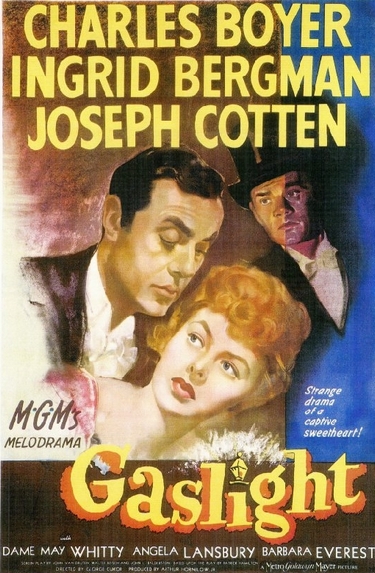

Angel Street was a hit in its Broadway premiere, and it remains one of the longest-running non-musicals in Broadway history, with 1,295 total performances. Premiering at the Richmond Theatre in London on 5 December 1938 before transferring to the Apollo Theatre in the West End on 1 January, the play closed after six months and 141 performances, but it has endured through an impressive list of incarnations most notably Five Chelsea Lane (1941 American play), Angel Street (1941 American play), and Gaslight (1958 Australian television play). Two years later, Hamilton's mother committed suicide.
Gaslight play driver#
Six years prior to the play Hamilton was hit by a drunk driver and dragged through the streets of London, leaving him with a limp, a paralyzed arm, and a disfigured face. Gas Light was written during a dark period in Hamilton's life. Hamilton's play is a dark tale of a marriage based on deceit and trickery, and a husband committed to driving his wife insane in order to steal from her. Gas Light is a 1938 thriller play, set in the Victorian era, written by the British novelist and playwright Patrick Hamilton. Visit our sponsor 1st 4 London Theatre to book tickets for Gaslight.On Angel Street, in the Pimlico district of London, 1880 Gaslight does not offer a demanding evening but thanks to such a well-judged production, its escapism might well have widespread appeal to fans of ripping yarns. While Cranham is the pick of the actors, both Woodall and Miss Pike, who spends a lot of time posing prettily and reflectively like some English Hedda Gabler, are also well worth watching. The setting fits the bill nicely and as one might expect with a title like this, Hartley T.A. At that point too, the gloom finally lifts over night-time London, seen above the house and some rays of symbolically hopeful sunshine welcome the final curtain. The second half of the play, during which there is more than a hint of irony in the performances, eventually leads to a satisfying conclusion as the spluttering murderer is led off to an appointment with the hangman. He spins a yarn of long-ago murder and missing rubies that inevitably leads to the conclusion that the murderer is a familiar figure, which in a cast of five including the policeman and two domestics leaves little room for shock revelations. This is not a Tennessee Williams kind of gentleman caller but a red-faced, retired policeman, the wonderfully-named Inspector Rough, given ironic life by Kenneth Cranham who is on really top form. The plot thickens, as a mystery caller takes advantage of one of Manningham's regular night-time absences to call on his wife. She may indeed be a little touched by this stage, as anyone sane would have called his bluff long ago. This stern man plays constant cruel tricks on Bond girl Rosamund Pike in the role of his hyperactive wife. It has taken seven years of marriage but by the time that the curtain rises to reveal a cramped London living room, designed by Hayden Griffen, Manningham has practically persuaded his attractive wife Bella that she has followed her mother into madness. He is a well-to-do scoundrel who is beastly to his girlish wife and far too friendly with the pouting, red-headed parlour maid, Sally Tatum's Nancy. Andrew Woodall, who starred in his Voysey Inheritance at the National last year, plays Jack Manningham. Gill has in fact surrounded himself with friends old and new. Unexpectedly, the best one on press-night resulted from an accident with a whisky glass and regular Gill collaborator Kenneth Cranham's subsequent brilliant adlib that should immediately be written into the script. However, by dint of thoughtful casting and a tone which suggests that at times, tongues are firmly in cheeks, we get two and a quarter hours of light-hearted, gripping entertainment, with a few surprises and more laughs. This is a melodramatic cod-Victorian detective story that is packed with inconsistencies of plotting and a baddie not unlike a thousand others. The play, twice filmed in the 1940s, is in reality a load of tosh - but of the highest class and at the Old Vic Gill makes something pretty special out of it.

Gaslight, first produced in 1939, and set half a century before is, in the writer's words, "good fun theatre".

This revival demonstrates once again what a good director Peter Gill is.


 0 kommentar(er)
0 kommentar(er)
